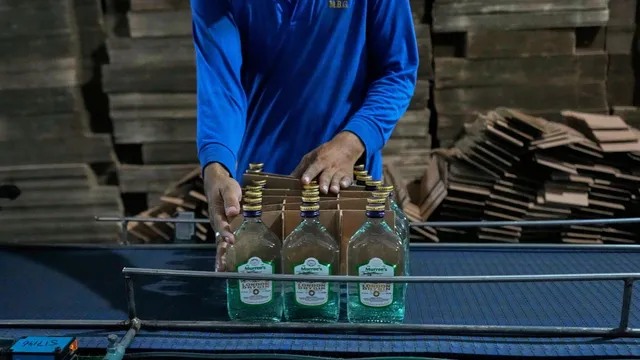
Pakistan's Murree Brewery thrives amid alcohol prohibition
2025-07-04 06:32- Murree Brewery operates in Pakistan, where alcohol is banned for Muslims but legal for non-Muslims.
- The company focuses on non-alcoholic beverages due to stringent government regulations on alcohol.
- Despite restrictions, Murree Brewery is financially successful, relying on a limited but elite customer base.
Express your sentiment!
Insights
In Pakistan, an Islamic republic where alcohol is banned for Muslims, Murree Brewery is navigating a unique landscape. Established in the 1970s, the company's status is unusual since alcoholic beverages are officially restricted for the majority of the country. However, it caters primarily to non-Muslim consumers, constituting approximately 9 million out of a total population of 241 million. The brewery is adapting its business model, focusing increasingly on non-alcoholic beverages such as energy drinks, malted beverages, and juices to mitigate risks associated with the alcohol ban. Despite significant limitations imposed by the government on prices, points of sale, and advertising for alcoholic products, Murree Brewery has reported healthy financials. In an environment characterized by strict regulations, the brewery has found a lucrative niche, benefiting from scant competition and a socio-economic elite that seeks its products. For context, non-Muslims are the only consumers allowed to purchase and drink alcoholic beverages legally, leading to a restricted customer base. The brewery's products, especially its malted drinks, are packaged to resemble traditional beer, catering to an existing demand while maintaining compliance with local laws. The company acknowledges that while non-alcoholic beverages may generate lower revenues, they present a more secured market opportunity. Murree Brewery’s adaptation highlights the challenges and strategies in operating within such a restricted market. Additionally, competition from other breweries such as the Chinese-run Hui Coastal Brewery, established in 2021 to serve the local Chinese community in Balochistan, has introduced new dynamics into an already constrained marketplace. The brewery's CEO, Bandhara, emphasizes the need for a level playing field for competition while expressing a confidence that their long-established reputation will sustain their market presence against newer entrants. As they navigate these complex regulations and market conditions, Murree Brewery stands as a notable example of resilience in an industry challenged by socio-cultural restrictions.
Contexts
In Pakistan, alcohol prohibition laws are primarily governed by Islamic law, which strictly prohibits the consumption of alcohol for Muslims. The legal framework surrounding alcohol consumption in Pakistan is complex, given the nation’s significant diversity, both in terms of religious beliefs and cultural practices. According to the Prohibition (Enforcement of Hadd) Order 1979, the sale and consumption of alcohol is banned for Muslims, but there are exceptions made for non-Muslim citizens and foreigners. This legal dichotomy has resulted in a variety of enforcement practices across different provinces and regions, contributing to a complicated landscape for both the production and consumption of alcoholic beverages in the country. The implementation of alcohol prohibition laws varies significantly across Pakistan, shaped by regional customs, local governance, and varying levels of adherence to Islamic law. For instance, in Sindh province, there are licensed alcohol shops serving non-Muslims, whereas in Khyber Pakhtunkhwa, the restrictions are much more stringent, and illegal production and consumption of alcohol can lead to severe penalties. The federal government has occasionally attempted to regulate alcohol more uniformly, but local authorities often maintain substantial control over enforcement, leading to diverse practices and regulations even within the framework of national laws. One major consequence of the prohibition laws is the emergence of a black market for alcohol. Illegal production and distribution of alcoholic beverages pose both health risks to consumers and challenges for law enforcement. Many individuals who seek alcohol resort to unscrupulous sources, which can lead to consumption of unsafe or toxic products. Moreover, the criminalization of alcohol has fueled underground networks that often intersect with larger organized crime operations, contributing to broader societal issues including violence, corruption, and a general disregard for law and regulation. Despite the prohibition, there is a longstanding tradition of alcohol consumption in Pakistan among non-Muslim communities, expatriates, and certain liberal urban populations. Cultural practices, such as social gatherings and events, often feature alcohol, reflecting a split between legal restrictions and social norms. Furthermore, discussions surrounding the reform of alcohol laws are ongoing in some circles, with arguments centering on personal freedoms, economic considerations, and the need to address the public health implications of prohibition. As Pakistan continues to navigate the interplay between religious dictates and modern legislation, the future of alcohol prohibition laws remains a dynamic and contentious issue.